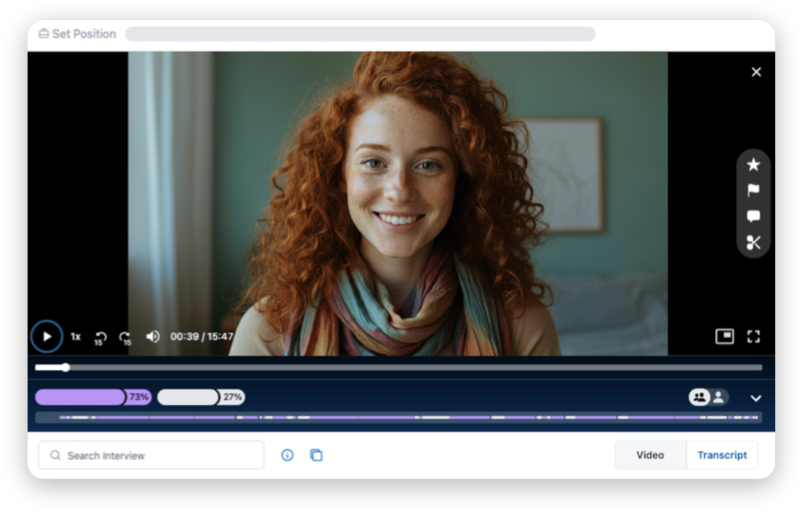
Focusing on creating an excellent employee onboarding process is a great way to introduce a new hire to your company, but it is certainly a matter of trial and error.
Chances are, your onboarding program won’t be perfect the first time around and simply needs some tweaks here and there to fine-tune the process. The question is, where and how should you tweak your onboarding process?
The best way to identify where your onboarding program may need some adjustment is by conversing with new hires and requesting their honest feedback on their onboarding experience through an employee onboarding questionnaire.
The significance of market research should not be underestimated, as it is undoubtedly the best way to learn more about your employees and how they view your organizational values. Therefore, asking employee onboarding survey questions is immensely efficient in gaining insights into the experience new hires have.
The True Colors Personality Test, for instance, will significantly aid your company in identifying various strengths, weaknesses, and learning styles of your employees. Such employee onboarding surveys will highlight how an employee’s own values fit into that of the company and its teams.
An in-depth employee onboarding questionnaire will also shed some light on the efficiency of your recruitment process and the onboarding experience that follows.
Here, we will explore some of the best employee onboarding survey questions you can ask new hires at various stages during their employment to investigate the competence of your onboarding process.

Employee Onboarding Survey Questions
Questions to Ask Employees After the Offer is Accepted
Your relationship with a new employee commences once they sign the offer letter. This pre-boarding period is your first opportunity to get some more feedback on the initial stage of the onboarding process and connect with your new team member.
As the new hire hasn’t technically begun their employment with you, your questions shouldn’t involve their experience in their new job role. Instead, your employee onboarding questions should revolve around the hire experience and initial onboarding process.
View this stage as an opportunity to ask essential employee onboarding survey questions regarding the overall recruitment experience and the company’s onboarding process right from the get-go.
You can send new hires anonymous employee survey questions, such as:
- Did you find it challenging to apply for this job?
- What are your thoughts on the company’s communication once you applied?
- What did you think of our recruiters?
- What did you think of our interviewers?
- What was your general impression of our hiring process?
- Did we answer questions you had regarding company policies, company culture, etc., sufficiently?
- What about this job excites you most?
- In a word, describe your onboarding experience.
- What are your suggestions on how we can improve our onboarding and recruitment process?
The initial stages of the onboarding experience are also the best time to ask new hires questions and present to them new employee survey questions about their expectations in the company. Their answers will serve as an excellent guide to ensuring employee development and satisfaction and increasing employee engagement.
Ask your new hire what they expect from their training session and if they feel anxious about starting their new job duties. Further, elaborate on what they hope to achieve in your company and if they view the opportunity as a long-term endeavor.

Onboarding Survey Questions For New Hires After the First Day of the Onboarding Process
The first day of starting a new job is daunting for most new hires, but fun onboarding programs can ease this transition. Therefore, it is essential to do everything you can to make every new hire feel welcome and comfortable in their new work environment.
The first day is one of the most crucial parts of the onboarding process since new employees must feel like they are effectively a valuable investment in your company. A new hire onboarding survey is the best way to ensure new hires are experiencing a well-structured onboarding.
New hires can answer some short surveys after their first day of work, which focuses primarily on the experience they had in the workplace and whether they found it pleasurable. Some top questions to ask new employees after their first day include:
- Was your onboarding successful or a bit confusing overall?
- Do you feel well-integrated and oriented into your team?
- Do you have any questions you’d like to ask?
- Was there anything we could have done to make you feel more comfortable in this new environment?
- Would you have preferred an onboarding buddy to go through the process with you?
- What were your first impressions of your co-workers?
Although you may feel inclined to ask a bunch of questions after a new employee completes their first day in your company, be sure to keep the survey short. A new employee has a lot of information to process, and it may all feel a bit overwhelming. Give them a chance to breathe and unwind after such an eventful day.

Questions to Ask New Hires After Their First Week
After the first week, new employees have likely had the opportunity to get to know some of their co-workers and become familiarized with their job duties. They should have gotten a better feel for what it’s like working in your company day-to-day.
Therefore, your employee survey questions can be a bit more specific and geared toward how their first impressions compare to their expectations. Such questions include the following:
- What do you think of your team leader?
- Do you get along with your co-workers so far?
- What is your impression of the CEO?
- Are you comfortable in your work environment?
- Do you feel welcome and included in the company?
- How much social interaction in the company have you had during your first week?
- Have your questions been answered sufficiently?
- How does your onboarding experience compare to your expectations?
- Did you gain a better understanding of the business goals of the company?
- Do you have a clear understanding of your current responsibilities in the company?

Questions to Ask New Employees After Their First Month
After the first month of employment, new team members have likely been introduced to some additional duties and responsibilities they have in the team. They will be a bit more comfortable in their new position and get a chance to engage with their colleagues.
Therefore, your survey questions can revolve around their overall experience and how productive and happy they are with their new job. Such questions include the following:
- How do your current responsibilities compare to your expectations?
- Do you feel motivated and driven to advance your career path in the company?
- Is there any training you would like to get?
- Did we satisfy your overall expectations during the course of this month?
It would be best if you also investigated how a new hire integrates into the team on a social level:
- Do you feel like you are in an inclusive workplace?
- Do you enjoy interactions with your team members?
- Have you experienced any instances of conflict?
- Do you feel safe talking about any issues you may have?
- How does your experience compare to other onboarding processes you’ve had in the past?

Questions to Ask New Hires After Their Third Month
At this point of a new hire’s tenure, the employee should feel settled and integrated into the company. However, it is still vital to check in on them from time to time and ensure they are still satisfied with their position.
Some top employee survey questions you can ask after three months of employment include the following:
- Do you think you would like to work for the company long term?
- Do you feel you need any additional training?
- Is the communication between your team and the managers up to standard?
- What was your overall feeling about the onboarding experience?
- Do you feel you fit well into the company culture?
- How can we advance your career development?
- Are you satisfied with your career path?
- If you could, what would you like to say to future new hires regarding the onboarding process?
- Do you feel your role contributes to the organizational goals?

The Importance of Asking New Employees Questions About the Onboarding and Recruitment Process
Although you may think that you’ve already hired a new employee and asked them everything you need to know regarding their skill set and how they approach company policies and job duties, the recruitment process is just the first step to building a long-lasting relationship with your employees.
There is still a lot of information that can prove to be exceptionally valuable as your employee become trusted team members in your company. The survey questions you ask new hires will allow you to assess how they fit into the organization and how they can contribute to business success.
Moreover, employee survey questions can significantly increase employee engagement and facilitate new hires’ adjustment to a new environment. Such questions also provide you with an avenue to see how an employee’s engagement has grown compared to a later stage of a new hire’s tenure.

The Benefits of Employee Onboarding Survey Questions
Optimized Employee Experience
An efficient new hire boarding process sets the tone for what employees can expect from their time with the company.
Employee onboarding survey questions that focus on factors like company culture, team dynamics, development, and organizational values will ensure your employees feel equally important as business profit.
Moreover, extending the surveys beyond the initial stages of employment effectively gives your company a competitive advantage to create a positive and engaging employee experience to increase employee retention.
Increased Employee Engagement
Employees who feel engaged right from the start will be more inclined to go to great lengths to be productive in their positions. When a job excites an employee, they will feel like they are contributing to the bigger business goals and be more engaged as a result.
Another sure way to optimize employee engagement is to integrate them into the company alongside an onboarding buddy. Such a person will act as their partner during the early days in the company and help them feel confident throughout the process.
Higher Employee Retention
Staff turnover is a widespread issue that could lead to significant expenses. Therefore, a good onboarding process is essential in retaining employees and ensuring they are happy in their roles.
The onboarding process starts the moment a prospective employee comes in for an interview. Ensure such new hires get a warm welcome right from the start to set the tone for an overall gratifying and inclusive experience.
Don’t bombard a new employee with paperwork and technicalities during the early stages. The first few days of the onboarding process should be geared towards ensuring a new hire is properly introduced to their co-workers and become comfortable and familiar with their job duties.
Keller specializes in employee development and coaching. We offer expert employee training and coaching for both individuals and groups.

We locate top talent
for business excellence
Connect with an Expert Recruiter
Our Success Fee Is 18% | No Upfront Fees
2-3 Week Interview Turnaround Time






